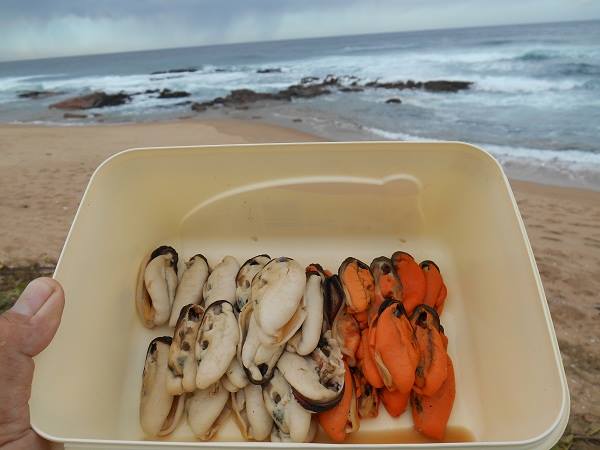Take a walk on the Wild side . . .
Facts about Mussels
Did you know?
Although some mussels can live for up to 50 years, the brown mussel that we find along the east coast of SA only lives about 2 years.
Pearls are cultivated in freshwater mussels.
You can tell the difference between wild and cultured mussels by looking for the dull bluish colour, white erosion marks and attached barnacles of the former. Cultured mussels have shiny blue-black shells.
The mussel’s arch enemy is the dog whelk, which bores a hole through its shell and sucks out the soft parts.
The mussel’s ‘beard’ is known as the byssus. It is used by the mussel to attach itself to surfaces with the aid of a secreted adhesive cement.
Before preparing a mussel for cooking and eating, the byssus should either by cut off or pulled out with a sharp tug, then discarded.
Mussels are usually prepared by steaming over a medium heat for about six minutes or until the shells open.
Because mussels contain liquid that emerges during the steaming process, you don’t have to add water when you’re steaming fresh mussels.
You shouldn’t be concerned if a batch of mussels is of different colours: pale white meat indicates a male mussel, and a warmer, more orangey colour, a female.
Mussels are a good substitute for clams or oysters in a recipe.
Mussel juice is delicious and can be drunk hot; it’s particularly tasty when mixed with a little melted butter, and can also be consumed chilled with tomato juice.
Although clams and oysters are sometimes eaten raw, mussels are usually cooked. (Note: Except in Africa, where the women and children often eat raw mussels on the rocks.)
While wild mussels need quite thorough cleaning, cultivated mussels need only be rinsed in cold water.
Mussels are delicious when pan-fried, too. To pan-fry, heat the pan, melt some butter then add the mussel meat and sauté until brown – two to three minutes.
Mussels rely on fish to carry their eggs in their gills during part of their life cycle.
Mussels have been cultivated for almost 800 years in Europe, and have been used as a food source for more than 2,000 years.
When buying mussels, the shells should be bright, undamaged and closed. Open mussels should be given a squeeze and a tap – if they close they are still alive; if not they are dead and unfit for consumption.
Mussels affix themselves to substrata such as rocks by their byssal threads or ‘beards’. These are produced as a liquid, which sets in contact with seawater.
The byssal threads are so adhesive they can even cling to Teflon; scientists are trying to develop a mussel-based adhesive for use in eye surgery.
Mussel meat is rich in protein, and has much less fat, many more mineral nutrients and a quarter of the calories of beef.
From: http://www.isleofshuna.co.uk/mussels/
Nutrition Highlights
Mussels (cooked, moist heat), 3 oz. (84.9g)
Calories: 146
Protein: 20g
Carbohydrate: 6.3g
Total Fat: 3.8g
Fiber: 0.0g
*Excellent source of: Selenium (76mcg), and Vitamin B12 (20mcg)
*Good source of: Zinc (2.3mg), and Folate (64mcg)
*Foods that are an “excellent source” of a particular nutrient provide 20% or more of the Recommended Daily Value. Foods that are a “good source” of a particular nutrient provide between 10 and 20% of the Recommended Daily Value.
http://www.truestarhealth.com/Notes/1839009.html
Male mussels are white, and females are orange.
(Photo: Glen Philips)
Total views: 96,552 |

Comments
John Ford (not verified)
Tue, 27/01/2009 - 18:23
Permalink
Very interesting! Could you
Jeff Brown
Wed, 28/01/2009 - 10:05
Permalink
It takes about 2 years to get
Anonymous (not verified)
Fri, 17/07/2009 - 09:51
Permalink
Mussles!
Jacqui (not verified)
Tue, 26/10/2010 - 15:37
Permalink
Mussels
Sarah Taylor (not verified)
Mon, 28/01/2013 - 10:30
Permalink
Breeding
Janice (not verified)
Sat, 24/08/2013 - 15:04
Permalink
mussel meat colour
Karl (not verified)
Tue, 24/09/2013 - 07:24
Permalink
mussels and seals
Anonymous (not verified)
Sat, 04/01/2014 - 14:32
Permalink
Are the mussels by kalk bay
Andrew Davies (not verified)
Wed, 15/02/2017 - 13:10
Permalink
Pearls and mussels
Jeff Brown
Wed, 15/02/2017 - 14:19
Permalink
Pearls are cultivated in mussels and oysters
Andrew Davies (not verified)
Thu, 16/02/2017 - 14:16
Permalink
Cultured pearls
Jeff Brown
Thu, 27/04/2017 - 11:38
Permalink
You're a really special
Ria (not verified)
Tue, 06/11/2018 - 13:01
Permalink
I urgently need to know the
Jacques (not verified)
Sat, 10/11/2018 - 18:36
Permalink
Hi I was wondering wild
Devi (not verified)
Fri, 01/02/2019 - 16:34
Permalink
We are interested in starting
James William Ansems (not verified)
Wed, 19/06/2019 - 05:01
Permalink
I got a question about
Add new comment